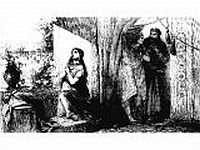 |
||
Spiritual Obstacles to Leaving AbuseOne of the things which is often not appreciated is just how difficult it is for a victim of abuse to come to terms with the various spiritual obstacles to leaving abuse they have to overcome before taking action (in addition to all the 'normal' obstacles common to believers and non-believers alike), let alone even to get to the stage of confiding in other Church members or clergy. Thinking back to my own experiences and spiritual struggles, I would like to point out some of the issues I struggled with, which kept me silent for much too long, prevented me from seeking help or taking advantage of the protection offered by the law of the land and the Police. Hence this is written from my perspective, that of a Christian wife, married to an abusive Christian husband: There are many Scriptural reasons which prevented me from speaking out and seeking help and which left me confused about my position regarding the abuse, including the belief that
Added to that, what examples do we find in Scripture?
We believe that "No temptation has seized you except what is common to man. And God is faithful; he will not let you be tempted beyond what you can bear. But when you are tempted, he will also provide a way out so that you can stand up under it." (1 Cor. 10:13), and hence that no matter how hard the abuse, we can bear it and it is a lack of faith to give up and escape it, but God will find the solution and end it. And we also believe that "all things work together for good to those who love God" (Rom. 8:28), hence if it does not look too 'good' it must be our love that is lacking, the fault is ours. On one hand we realise that our husband is being overtaken in a fault, and we have a duty to try to prevent him from sinning (Gal. 6:1), on the other hand, we feel responsible for the abuse, as though we were the ones causing our Christian husband to stumble and sin (Mark 9:42,43) hence the fault lies with us, and we need to do the changing. What right then do we have to object to the speck in our brother's eye, when we have a mote in our own? (Mat. 7:4-5) How can we throw the first stone? (John 8:7). There are also other spiritual obstacles to leaving abuse to overcome, which are specific to our Community and similar ones:
I could go on and on about the various spiritual obstacles to leaving abuse we face, but will leave it at that for now. Suffice it to say, before the Church is a position to act either in trying to help the abuser to own his/her actions and heal, or in support of the victim of abuse, there is a very long, hard spiritual journey for the victim just in being able to admit the abuse for what it is, let alone speak out about it and bring the problem before the Church. Return from Spiritual
Obstacles to Leaving Abuse to Religion and DV. |
In This Section:Religion and DV Related Pages:Abigail's Story
Sometimes Christian women get so bogged
down in guilt and the need to save our marriage, that we
forget to save ourselves. This book is a must read for anyone
in an abusive marriage seeking spiritual guidance. Solid, Christlike
interpretation of scripture will offer much needed inspiration and
encouragement.
To order in the US: Keeping the Faith: Guidance for Christian Women Facing Abuse
To order in the UK: Keeping the Faith: Guidance for Christian Women Facing Abuse The Christian woman whose spirit is being
crushed by domestic violence is faced with a unique burden. She needs
straight answers - not unrealistic expectations or stereotypical platitudes.
"Woman Submit!" by Jocelyn Andersen provides straight answers
and clear scriptural direction.
To order in the US: Woman
Submit! Christians & Domestic Violence
To order in the UK: Woman
Submit! Christians & Domestic Violence When is divorce biblically permissible
and when is it forbidden? And is remarriage ever permissible for a
divorced Christian? The problem is particularly intense for Christian
victims of marital abuse, who often believe they must choose between
two unpleasant alternatives: endure abuse, or face condemnation by
God and his church for disobeying the bible.
To order in the US: Not
Under Bondage: Biblical Divorce for Abuse, Adultery and Desertion
To order in the UK: Not
Under Bondage: Biblical Divorce for Abuse, Adultery and Desertion
|
|
|
Click on the donate botton below to support Hidden Hurt. Thanks you.
No Place for Abuse demonstrates that the problem of
domestic violence in the church is more pervasive than most Christians would
like to believe. Nancy Nason-Clark, a trained sociologist,
and Catherine Clark Kroeger, a biblical scholar, confront the
issue with both objectivity and compassion. The authors give practical
tools to pastors and other counselors for interviewing abuse victims
and perpetrators and offer alternatives victims may consider instead
of continuing to endure a threatening environment. Another valuable
contribution the authors make is their caution against the misrepresentation
of Scripture in ways that fail to protect abuse victims. This thought-provoking
book has the potential to open the eyes of many believers who don't understand
the prevalence of violence in many evangelical homes. It will be particularly
useful to pastors and counselors, but will offer guidance to any Christian who
has encountered such situations.
To order in the US: No Place for Abuse: Biblical & Practical Resources to Counteract Domestic Violence
To order in the UK: No Place for Abuse |
||
|
Hidden Hurt Home
| Hidden Hurt Sitemap | Contact
Us
Copyright© 2002 - 2015 Hidden Hurt.
|
||


